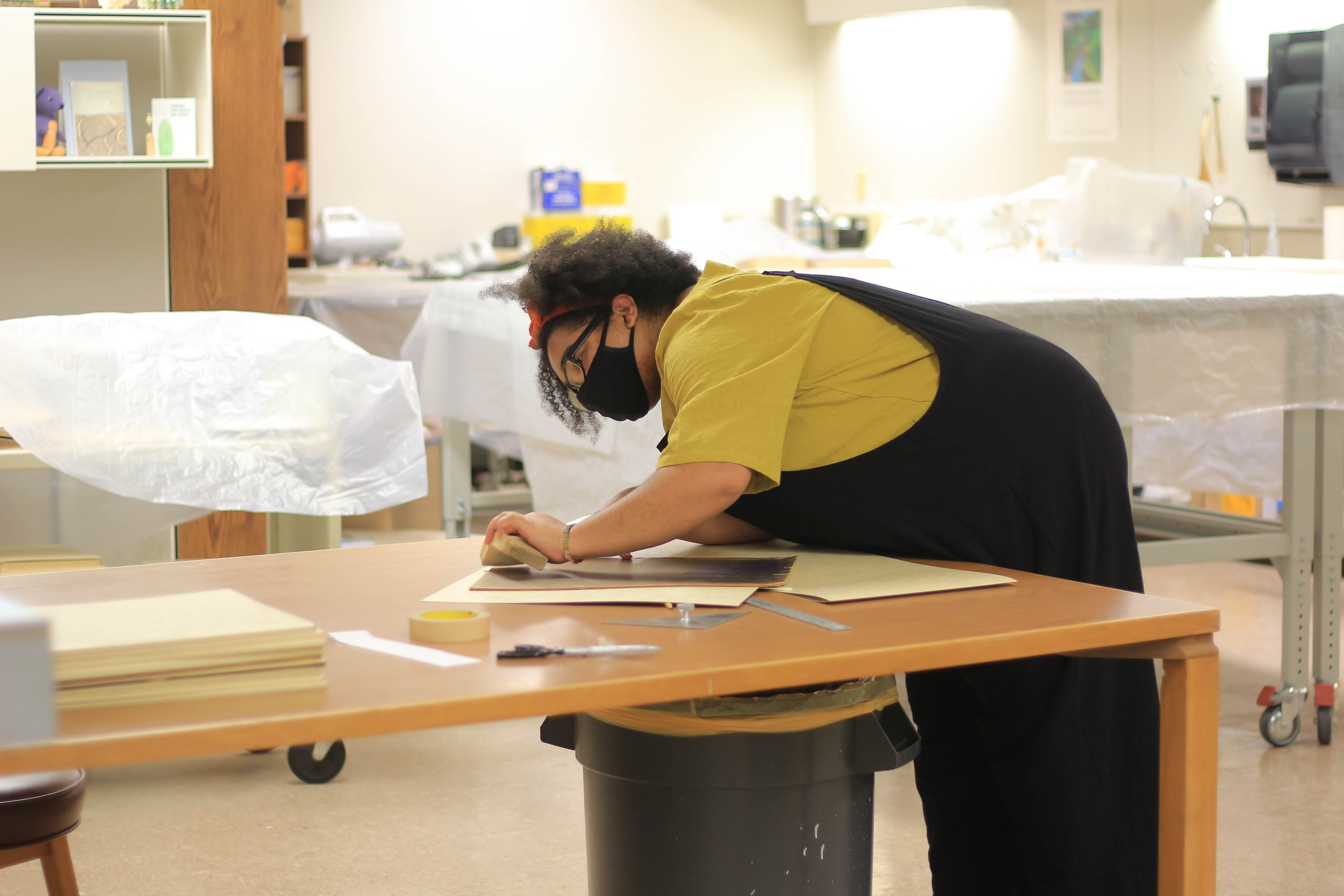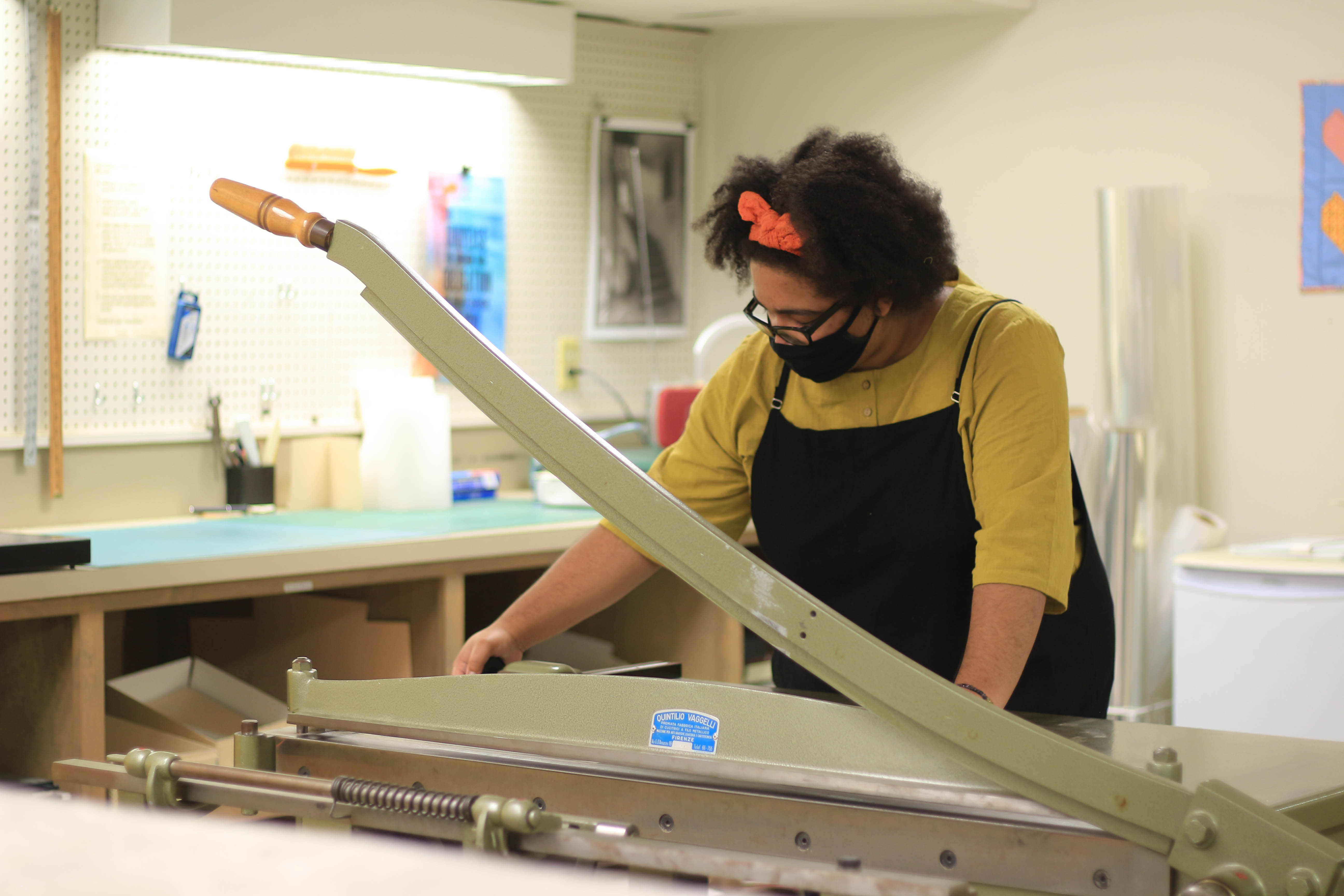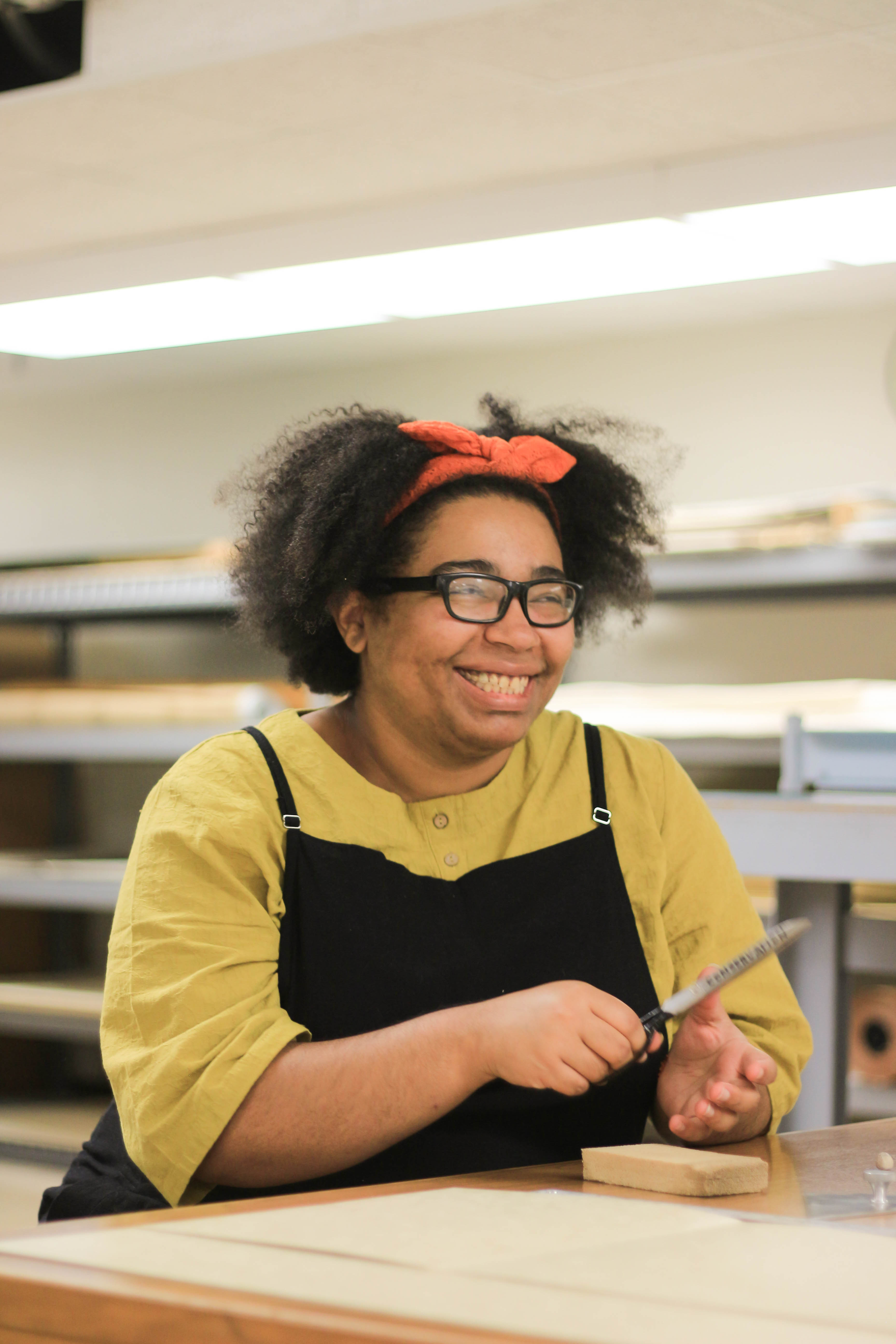“The record, sometimes, is not very welcoming to me.” – Dre Tarleton, graduate assistant in LSU Libraries Special Collections
In the summer of 2020, LSU Libraries was presented with an unrestricted donor gift of $50,000 that allowed the Libraries to create a graduate assistantship in Special Collections and Digital Programs & Services for a student from a traditionally underrepresented group wishing to study archives and special collections. A portion of the donor fund was also used to increase holdings related to diversity, equity, and inclusion (DEI) in the main library.
Dre Tarleton, graduate assistant in LSU Libraries Special Collections (2020-2021).
Dre Tarleton, a Master of Library and Information Science (MLIS) student in the LSU School of Library and Information Science, was hired in September 2020 for this graduate assistantship. Tarleton (they/them/their); Gina Costello (she/her/hers), associate dean, technology initiatives / special collections; and Zach Tompkins (he/him/his), university archivist, shared how the assistantship was created and the impact it has had on the Libraries.
The generous gift enabled the Libraries to respond to current DEI-related events in tangible ways that follow national trends in the library and information sciences (LIS) profession. LIS professionals in the U.S. are majority white and female, which does not reflect the diverse population libraries, archives, and cultural heritage institutions serve. The lack of representation among LIS professionals has potentially deleterious effects on the completeness of library and archival collections and the ability to provide relevant services to all types of patrons (see: “The Important of Being Diverse: The Archival Profession and Minority Recruitment” by Kathyrn M. Neal).
National groups such as the American Library Association (ALA) and the Society of American Archivists (SAA) have consistently placed diversification among LIS professionals and equitable representation within library and archival collections as top priorities for the profession (see: ALA Equity, Diversity, and Inclusion and SAA Diversity and Inclusion Initiatives). LSU Libraries, despite being situated in a diverse state and city, has historically struggled to meet university and departmental goals related to DEI. Noting the lack of diverse LIS professionals applying for positions at LSU Libraries, Costello sought ways to increase representation other ways.
Costello attributes the lack of students from underrepresented groups in LIS programs as one reason recruitment is difficult. “We’re doing what we can to get more faculty and staff from underrepresented groups working in the Libraries, and especially in Special Collections, but I’ve been on so many hiring committees and the numbers [of diverse applicants] are just not there.” Her solution was to create a pilot program with a graduate assistantship that specifically targets students from underrepresented groups.

As part of their rotations, Tarleton has assisted with the conservation of fragile materials. Conservation is highly skilled work that enables researchers to access materials that would otherwise have decayed beyond use.
This assistantship, along with the Goodrich-Taylor assistantship established in 1992, offers graduate students real-world job experience working in a world-class archive. Costello hopes to be able to continue the new assistantship, pending additional funding, in order to establish a pipeline of new information professionals from underrepresented groups working in archives and special collections.
According to Costello and Tompkins, Tarleton is an ideal candidate for the pilot program because their academic background and interests aligned with the priorities of Special Collections. Tarleton is a native of Patterson, La. who received their bachelor’s in Women and Gender Studies and master’s in Cultural Anthropology from LSU. Their interest in archives began with their undergraduate research related to race, gender, and equity. Tarleton discovered the power of archives to decide whose voices are heard and whose are diminished through the selections of which historical records to collect, preserve, and make available. “I realized that doing work in archive is like having a say [in] which underrepresented voices get pushed over…how they can be represented in a way that’s different from the typical lens.”
Now that they are pursuing their MLIS with a Graduate Certificate in Archival Studies, they see their work in the assistantship as a culmination of their previous studies and a way to further develop their activist approach to archives. Tompkins, who supervises the position, noted that Tarleton’s work in University Archives has helped improve diversity within the materials collected. “LSU Libraries supports the mission of the entire campus to generate, preserve, disseminate, and apply knowledge and cultivation of the arts.

On the importance of conservation at LSU Libraries Special Collections, Tompkins says,
“It’s a crucial function. Treatment of the material improves its usability for research. It’s paramount to our mission.”
So, it’s our job to support research and instruction with the use of primary source materials in a way that everyone in the LSU community can engage with these unique and complex stories.” Their contributions will have a lasting impact on the future of university archives.
During the year Tarleton has worked in Hill Memorial Library they have encountered the full life cycle of a record within an academic archive. Tompkins emphasized that the focus for this role is cross-training since his unit, University Archives (UA), represents one of the three main collecting areas of LSU Libraries Special Collections: rare books, historical manuscripts, and books related to the Louisiana and Lower Mississippi Valley region, and university history. While UA includes the university’s official record, Tompkins has also prioritized “unofficial records,” which are materials from students, student organizations, and other smaller entities on campus that are not otherwise captured through official record collection mechanisms. Tarleton has assisted not only with the processing of university records but also conservation and digitization.
Tarleton attributes the dynamic experiences across different units in Hill to increased professional confidence. “I feel like I will be able to apply to multiple types of jobs…The assistantship has given me the ability to make executive decisions and have confidence in myself as an archivist.” Tompkins adds, “The major benefits of working in this specific institution is that the leadership puts such an emphasis on trusting people to exercise some creativity and afford them the latitude to seek out the projects that they want to do.”
Reflecting on the rotational nature of their position, Tarleton says, “This [position] has really given me an opportunity to see how archives can also function within the framework of, I want to say liberation…how it can be used as a powerful way of moving forward away from the system that none of us here have created, but we are living with it.” Tompkins added, “The way that we are evaluating ourselves as archivists and how we hope to be evaluated by our successors [is]: did they do everything that they could every day to chip away at the barriers between the people and this accurate and truly representative history?”

Tarleton commented that they find comfort in conservation work. To relax, they often watch videos by Baumgartner Fine Art Restoration, the oldest conservation and restoration studio in Chicago.
Tarleton notes that interacting with materials has been one of their greatest challenges since the people, places, ideas, and events captured within the material reflect a time that is often incongruous with modern points of view. University libraries, such as Harvard and Stanford among others, have addressed the issue of outdated and inappropriate language within collections with official guidelines for more inclusive description practices as well as potentially harmful and offensive materials statements. Notably, there is resistance among archivists to censuring collections since there is a need to provide an unfiltered history despite the undesirable aspects of the historical record (see: “Archiving Hate: Racist Materials in Archives” by Melissa J. Nelson). However, too often stories that promote a better understanding of history are untold in the archives.
Tarleton has experienced discomfort when encountering certain records, and lamented “The record, sometimes, is not very welcoming to me.” However, because of their activist approach to archives, they recognize the necessity of professional resilience and seek to counter polarized historical narratives. They seek to preserve and make more available perspectives that illuminate the full color of history by further exposing its nuance and complexity. They explain, “You have to pay attention to what voices are silent and that’s where you get the real story.”
As an administrator, Costello understands the value of the representation that someone like Tarleton brings into their work, especially as the field reckons with its legacy of white, heteronormative supremacy that persists throughout American systems and institutions. Although this current assistantship expires when Tarleton graduates in December, Costello seeks to continue recruiting students and professionals from underrepresented groups, be it through an assistantship, the LSU Libraries Diversity Residency Program, and/or permanent position. She says that the best outcome for any of these initiatives is that the person has “… a positive experience at LSU.” For Tarleton, LSU Libraries has already exceeded that goal.
____
Zach Tompkins was interviewed in 2020 in A Conversation with Zach Tompkins, University Archivist for American Archives Month. Ebony McDonald, the Libraries’ first diversity resident, shared her experience in LSU Libraries Special Collections in 2019 through “Resident reflects: An awakening with regional archivists.”
For more information about LSU Libraries Special Collections, visit lib.lsu.edu/special.
The LSU Libraries includes the LSU Library and the adjacent Hill Memorial Library. Together, the libraries contain more than 4 million volumes and provide additional resources such as expert staff, technology, services, electronic resources, and facilities that advance research, teaching, and learning across every discipline.